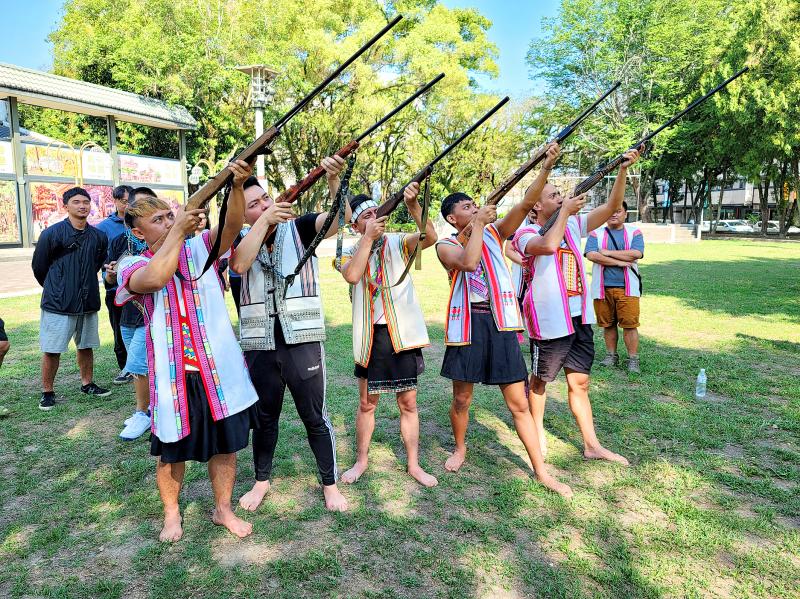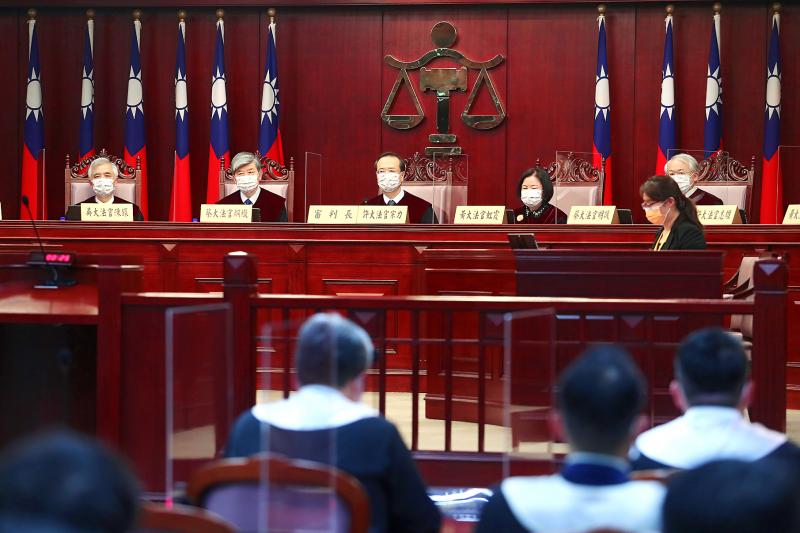The Council of Grand Justices yesterday ruled that some hunting restrictions on Aborigines were unconstitutional, but stopped short of supporting a total overhaul of regulations, which some hunting advocates had called for.
Hunting restrictions have become a contentious issue among Aboriginal communities.
Under current regulations, Aboriginal communities are only allowed to hunt with self-made shotguns during certain festivals and only with prior approval from authorities.

Photo: Tung Chen-kuo, Taipei Times
Advocates say the self-made firearms are dangerous and that restrictions impede on the subsistence hunting traditions their communities have practiced for centuries.
In Constitutional Interpretation No. 803, the grand justices found portions of the Controlling Guns, Ammunition and Knives Act (槍砲彈藥刀械管制條例) and the Wildlife Conservation Act (野生動物保育法) unconstitutional.
Although the Controlling Guns, Ammunition and Knives Act specifies the kind of guns and munitions Aborigines can make, it contravenes the Constitution’s protection of Aborigine’s and their way of life, as the regulations do not consider the safety of those making the guns, the grand justices found.

Photo: CNA
The National Police Agency must amend the act to make it compliant with the Constitution within two years, the council said.
Under the act, Aborigines cannot manufacture, transport or own self-made shotguns or harpoons for making a living without a permit.
The interpretation said that the Constitution protects the traditional cultures of Aboriginal communities, but this protection is predicated on the basis that these are not used for commercial purposes.
However, the Wildlife Conservation Act does not protect Aborigines’ right to hunt protected species, the interpretation said.
A requirement that Aborigines apply to hunt five days in advance, with a ban on unplanned hunting, was unreasonably rigid and unconstitutional, in contravention of the principle of proportionality, it said.
Under the rules, Aborigines must specify the animals they would hunt and how many they would kill in an application, which the interpretation also found unconstitutional.
The ruling followed the 2015 conviction of Tama Talum, a Bunun hunter charged with killing two animals from protected species with a modified shotgun in 2013.
Talum was sentenced to three-and-a-half years in prison, a verdict that caused outrage within Aboriginal communities and sparked a long-running legal battle over the acts.
Talum said he was following tribal customs and was hunting the animals to feed his mother.
The case was in 2017 appealed to the Supreme Court, which upheld the conviction and sentence, but also asked the Council of Grand Justices to review hunting regulations.
Talum called the council’s constitutional interpretation “regrettable” and said he would continue to hunt.
The ruling yesterday does not affect Talum’s case, which is to resume at the Supreme Court.
Hsieh Meng-yu (謝孟羽), a lawyer with the Legal Aid Foundation, said the ruling went “90 percent” against Talum.
However, it was the first time a court has recognized that Aboriginal hunting was “a cultural right that should be respected and protected by the state,” Hsieh said.
The foundation would push for a suspended sentence for Talum, Hsieh added.

The CIA has a message for Chinese government officials worried about their place in Chinese President Xi Jinping’s (習近平) government: Come work with us. The agency released two Mandarin-language videos on social media on Thursday inviting disgruntled officials to contact the CIA. The recruitment videos posted on YouTube and X racked up more than 5 million views combined in their first day. The outreach comes as CIA Director John Ratcliffe has vowed to boost the agency’s use of intelligence from human sources and its focus on China, which has recently targeted US officials with its own espionage operations. The videos are “aimed at

STEADFAST FRIEND: The bills encourage increased Taiwan-US engagement and address China’s distortion of UN Resolution 2758 to isolate Taiwan internationally The Presidential Office yesterday thanked the US House of Representatives for unanimously passing two Taiwan-related bills highlighting its solid support for Taiwan’s democracy and global participation, and for deepening bilateral relations. One of the bills, the Taiwan Assurance Implementation Act, requires the US Department of State to periodically review its guidelines for engagement with Taiwan, and report to the US Congress on the guidelines and plans to lift self-imposed limitations on US-Taiwan engagement. The other bill is the Taiwan International Solidarity Act, which clarifies that UN Resolution 2758 does not address the issue of the representation of Taiwan or its people in

US Indo-Pacific Commander Admiral Samuel Paparo on Friday expressed concern over the rate at which China is diversifying its military exercises, the Financial Times (FT) reported on Saturday. “The rates of change on the depth and breadth of their exercises is the one non-linear effect that I’ve seen in the last year that wakes me up at night or keeps me up at night,” Paparo was quoted by FT as saying while attending the annual Sedona Forum at the McCain Institute in Arizona. Paparo also expressed concern over the speed with which China was expanding its military. While the US

SHIFT: Taiwan’s better-than-expected first-quarter GDP and signs of weakness in the US have driven global capital back to emerging markets, the central bank head said The central bank yesterday blamed market speculation for the steep rise in the local currency, and urged exporters and financial institutions to stay calm and stop panic sell-offs to avoid hurting their own profitability. The nation’s top monetary policymaker said that it would step in, if necessary, to maintain order and stability in the foreign exchange market. The remarks came as the NT dollar yesterday closed up NT$0.919 to NT$30.145 against the US dollar in Taipei trading, after rising as high as NT$29.59 in intraday trading. The local currency has surged 5.85 percent against the greenback over the past two sessions, central